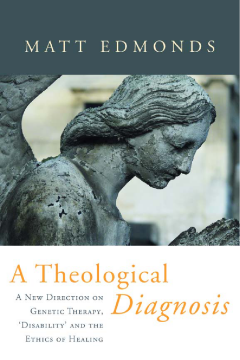
Additional Information
Book Details
Abstract
As society becomes progressively dominated by an ideology of healthy living, Matt Edmonds makes a vital critique of contemporary efforts to remove 'disability' from the world around us. Surveying the logic and language of both secular and religious health movements, Edmonds highlights the misplaced generalisations and dubious values that cumulatively serve to undermine individual inclusion and well-being on a day-to-day basis.
'A Theological Diagnosis' seeks a new direction. From the resources of Christian theology it finds a paradigm with which to examine the infections of genetic theory, faith healing and the meaning of 'disability' so as to prescribe a way forward for both believer and non-believer alike. Combining history, theology and thoughtful analysis, this is a prescription that none of us can afford to ignore. Quite simply, there is little time left.
Advances in genetic technologies raise important theological questions. Edmonds (independent scholar) directs his historically grounded, theologically astute, and pastorally insightful book toward Christian communities struggling with genetic technologies' ethical and pastoral implications. The book gives a good overview of the history of genetic exploration, and of the debates over those explorations, set within a Christian theology of personhood. This theology focuses on ways that identities are formed in relationship rather than being radically autonomous, and how that relational knowledge should shape theological and ethical thinking. Among recent titles on genetics, this book is unique in its accessibility for readers unfamiliar with more technical theological debates. Large theology collections will find it a useful addition.
CHOICE Magazine
This left me wordless. [An] important publication which should be included in bioethics, pastoral theology and ecclesiology reading lists
The Way
This book has a bold intention, namely, to examine genetic therapies through alternative lenses, including not just a perspective from theological reflection but also from those who suffer disabilities. As an academic achievement this book bears the marks of its origin as an MPhil thesis.
Theology
This is an important publication which should be included in bioethics, pastoral theology and ecclesiology reading lists. Most of all, it will appeal to anyone who cares that the Church be truly Christ-like and our society truly human.
The Way
[A] historically grounded, theologically astute, and pastorally insightful book...unique in its accessibility for readers unfamiliar with more technical theological debates
CHOICE Magazine
This book will be of some use to theologians, clergy and lay readers seeking new insights on disability and healing. Although written from a Christian perspective, the book is relevant to non-Christians with an interest in the ethics of genetic technologies. Edmonds' theology of healing is bold; his exploration of ethics in relation to 'faith healing' has much to offer a church that does not often critique its own approaches to health and illness.
Disability & Society
A superbly argued book, A Theological Diagnosis is well supported by its bibliography and indices and will be of enormous assistance to all of us living or working with disability.
Ministry Today
Well referenced and indexed this is a complex book, difficult to summarise briefly but well worth reading.
Triple Helix
Matt Edmonds is a writer, theorist and theologian with degrees from both Oxford and Cambridge University. In a varied 26 years he has toured the world playing music with Johnny Flynn and The Sussex Wit, written comedy for the BBC and Channel Four, and shown thousands to the animatronic T-Rex, working for London's Natural History Museum. This is his first book.
THIS lovely study seeks to overturn prevalent conceptions about "disability", and to offer a more loving and graceful approach to individuals with all their distinctive and varied differences. It challenges some of the all-too-prevalent assumptions made in claims for both genetic intervention in the secular world and for faith healing within many Churches. Instead, it offers an approach that the author hopes could be adopted by secular and religious people alike.
Church Times
